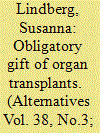| Srl | Item |
| 1 |
ID:
184645


|
|
|
|
|
| Summary/Abstract |
The internationalization of medical services—including organ transplantations—is driven by advances in technology and integration of trade. Patients in need of organ transplants began to seek these services outside their countries of origin in the 1980s and 1990s, and this practice expanded in the ensuing decades. While these transplants yielded benefits to some, abuses included human trafficking, preying on vulnerable populations, and negative outcomes in health equity. This case study of efforts to regulate the international transplant trade yields important findings for our understanding of global health governance. First, it provides support to the “globalization reformers” who maintain that if globalization’s benefits are to be widely distributed, institutional mechanisms must be enacted. Second, it provides another example of the externalities that occur when health concerns are absent, poorly represented, or weakened in trade negotiations. Finally, it demonstrates limits of a global health regime that lacks a centralized authority.
|
|
|
|
|
|
|
|
|
|
|
|
|
|
|
|
| 2 |
ID:
122996


|
|
|
|
|
| Publication |
2013.
|
| Summary/Abstract |
Recent debates on biopolitics have focused on negative and positive interpretations of "life" that is the object of biopolitical apparatuses. Agamben examines the "bare life" that is produced by the sovereign ban, Negri and Hardt speak on the contrary of emancipatory biopolitical production, while Derrida and Esposito study (auto-)immunitary reactions that constitute living beings. The aim of this article is to examine a concrete case that permits to evaluate the explanatory power of these positions. The test case pertains to the recent amendment of the Finnish law on the medical use of human organs, tissues, and cells. It shows very clearly how phenomena that conventionally constitute the basis of proper, personal existence, namely the biological body and death, are not natural phenomena anymore, insofar as they are delimited by biopolitical decisions, that also redefine social relations in a radical manner.
|
|
|
|
|
|
|
|
|
|
|
|
|
|
|
|